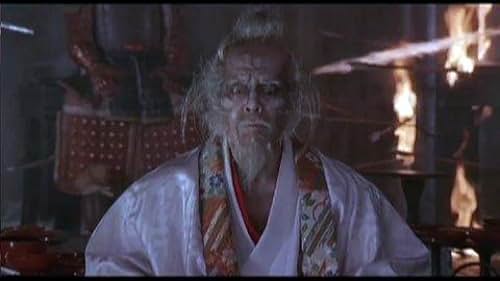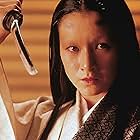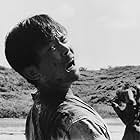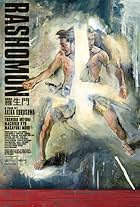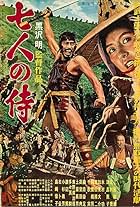In Medieval Japan, an elderly warlord retires, handing over his empire to his three sons. However, he vastly underestimates how the new-found power will corrupt them and cause them to turn o... Read allIn Medieval Japan, an elderly warlord retires, handing over his empire to his three sons. However, he vastly underestimates how the new-found power will corrupt them and cause them to turn on each other...and him.In Medieval Japan, an elderly warlord retires, handing over his empire to his three sons. However, he vastly underestimates how the new-found power will corrupt them and cause them to turn on each other...and him.
- Won 1 Oscar
- 30 wins & 23 nominations total
Mansai Nomura
- Tsurumaru
- (as Takeshi Nomura)
Storyline
Did you know
- TriviaAkira Kurosawa referred to his previous film, Kagemusha: The Shadow Warrior (1980), as a "dress rehearsal" for this film. He spent ten years storyboarding every shot in the film as paintings. The resulting collection of images was published with the screenplay.
- GoofsDuring the battle at the third castle, there is a sequence where Hidetora emerges from the castle at the top of a flight of stairs and confronts enemy soldiers ascending the stairs. When he retreats, his bodyguards suddenly appear and retreat with him, even though they were not present moments earlier.
- ConnectionsFeatured in A.K. (1985)
Featured review
Based on Shakespeare's King Lear, this film follows the story of the aging warlord Hidetora who, in an attempt to restore peace, divides his kingdom between his three sons - Taro, Jiro, and Saburo - and retires from his duties. However, one of his sons sees this as unwise and is banished by his father, leaving his two brothers in charge of two of the three castles left in their hands. It isn't long before they are overtaken by greed and eventually betray their father, leaving him in the hands of a philosophical jester and a loyal retainer. This betrayal ultimately leads to war, dividing the family and driving Hidetora insane.
The remarkable script, which contains many of my favorite lines from any film, still manages to break its way through the confinement of subtitles and reveals itself to be one of the richest Kurosawa ever wrote. He has obviously worked equally hard on the look and feel of the film - the cinematography being excellent (example: the long, continuous shot of Saburo's men charging on horseback across a river).
There's also something rather frightening about it that I can't quite put my finger on. The first battle, which is the film's turning point, is the most horrifying, yet strangely beautiful, battles ever filmed. A good effect used is the loss of sound, with only Toru Takemitsu's haunting score to be heard. The entire battle lasts less than ten minutes and there is no uplifting or bombastic music to be heard, but in my opinion, it's Ran's finest scene, and thus the finest scene ever.
What Kurosawa managed to get rather than give though was excellent performances from his actors, none more brilliant than Tatsuya Nakadai's Hidetora, Mieko Harada as Lady Kaede (a woman similar to Lady Macbeth but with a different hidden agenda), and the strangely-named Peter as Kyoami.
The remarkable script, which contains many of my favorite lines from any film, still manages to break its way through the confinement of subtitles and reveals itself to be one of the richest Kurosawa ever wrote. He has obviously worked equally hard on the look and feel of the film - the cinematography being excellent (example: the long, continuous shot of Saburo's men charging on horseback across a river).
There's also something rather frightening about it that I can't quite put my finger on. The first battle, which is the film's turning point, is the most horrifying, yet strangely beautiful, battles ever filmed. A good effect used is the loss of sound, with only Toru Takemitsu's haunting score to be heard. The entire battle lasts less than ten minutes and there is no uplifting or bombastic music to be heard, but in my opinion, it's Ran's finest scene, and thus the finest scene ever.
What Kurosawa managed to get rather than give though was excellent performances from his actors, none more brilliant than Tatsuya Nakadai's Hidetora, Mieko Harada as Lady Kaede (a woman similar to Lady Macbeth but with a different hidden agenda), and the strangely-named Peter as Kyoami.
- O_L_D_B_O_Y
- Dec 29, 2004
- Permalink
Details
Box office
- Budget
- $11,500,000 (estimated)
- Gross US & Canada
- $4,135,750
- Opening weekend US & Canada
- $3,567
- Jul 2, 2000
- Gross worldwide
- $4,172,576
- Runtime2 hours 40 minutes
- Color
- Aspect ratio
- 1.85 : 1
Contribute to this page
Suggest an edit or add missing content



